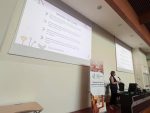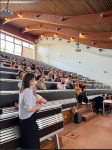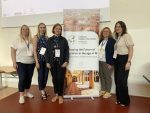Digital Well-being at the EDEN Annual Conference 2025
On June 15-17, the Eden 2025 Annual Conference was held at the oldest university in the Western world – the University of Bologna. The EDEN Digital Learning Europe Annual Conference 2025 focused on the future of education in the age of AI. The conference explored the opportunities and challenges posed by generative AI, recognizing its potential for growth and innovation in education, while critically addressing the associated risks. The conference further presented different scenarios of AI integration in education, ranging from personalized learning to global learning networks.
However, digital well-being, its relevance in education, was also an integral topic at the conference.
VMU team has organised and moderated during the conference Action Lab: Defining Well-being in Digital Education Ecosystem.
Prof. Airina Volungevičienė presented a new policy experimentation project WINDEE – Well-being in Digital Education Ecosystem in Europe (no. 101195779 WINDEE — ERASMUS-EDU-2024-POL-EXP), the aim of which is to foster an environment where students can achieve digital well-being and maximise the benefits of technology in educational settings. After the presentation session, participants divided into groups and engaged in discussions.
The well-being of students and educators in digital education is one of the “must” conditions in the education ecosystem. Research claims that it is possible to find various ways to define the concept of digital well-being, and that the definition most probably will be dynamic and flexible depending on the perspective taken, but it looks like psychological, emotional, physical and social factors and the conditions ensured remain to be the main pillars in the majority of the discussions on the theme.
The Action lab was dedicated to work in groups to unpack the concept of well-being in digital education ecosystem and then to mingle together to set up the scene where person – specific, context – specific and device – specific factors request the setting up the context for learning and teaching in digital age in the way that students and teachers feel balanced to the extent potential.
All participants actived contributors to the joint picture and the definition of well-being in digital education ecosystem.
Workshop participants discussed and listed out factors and characteristics of digital wellbeing, defined what digital wellbeing is, and what it means for students and teachers.
The theme of the choice and decision-making in the balanced use of technologies was a recurring motif across group discussions
DISCLAIMER: “Funded by the European Union. Views and opinions expressed are however those of the author(s) only and do not necessarily reflect those of the European Union or the European Education and Culture Executive Agency (EACEA). Neither the European Union nor EACEA can be held responsible for them.”

















